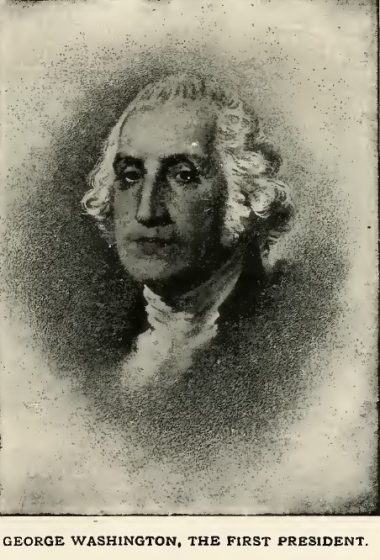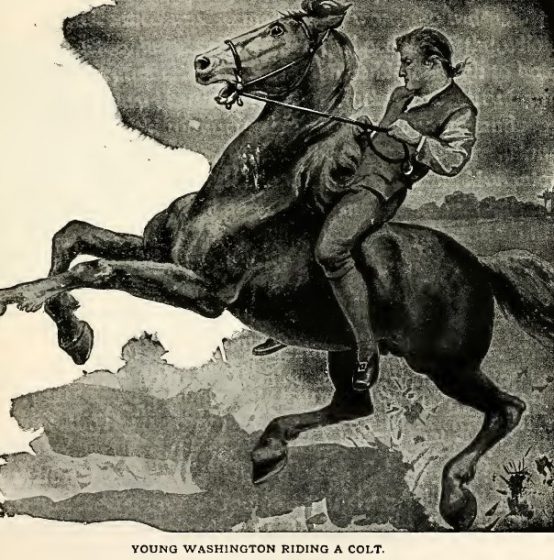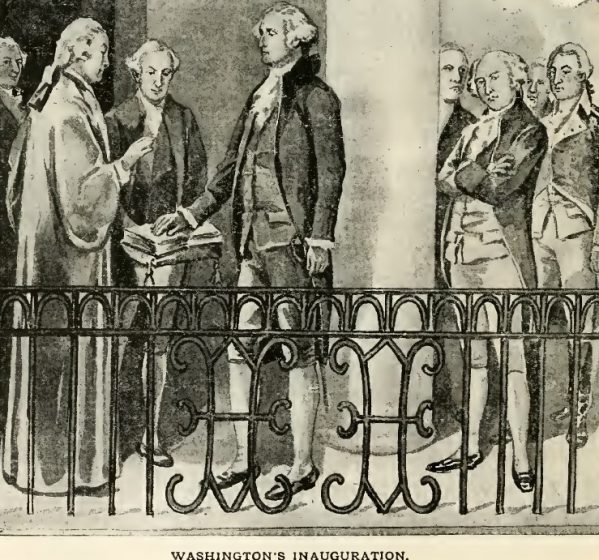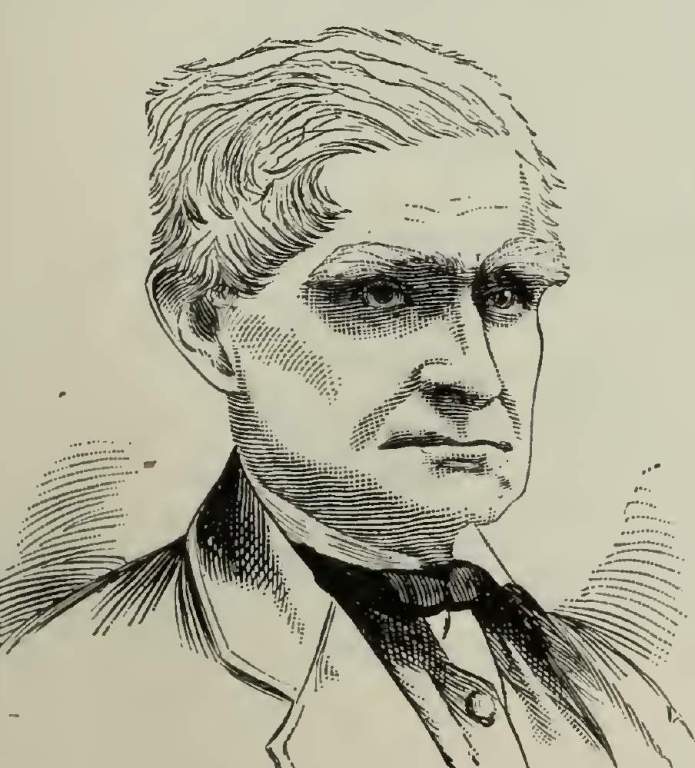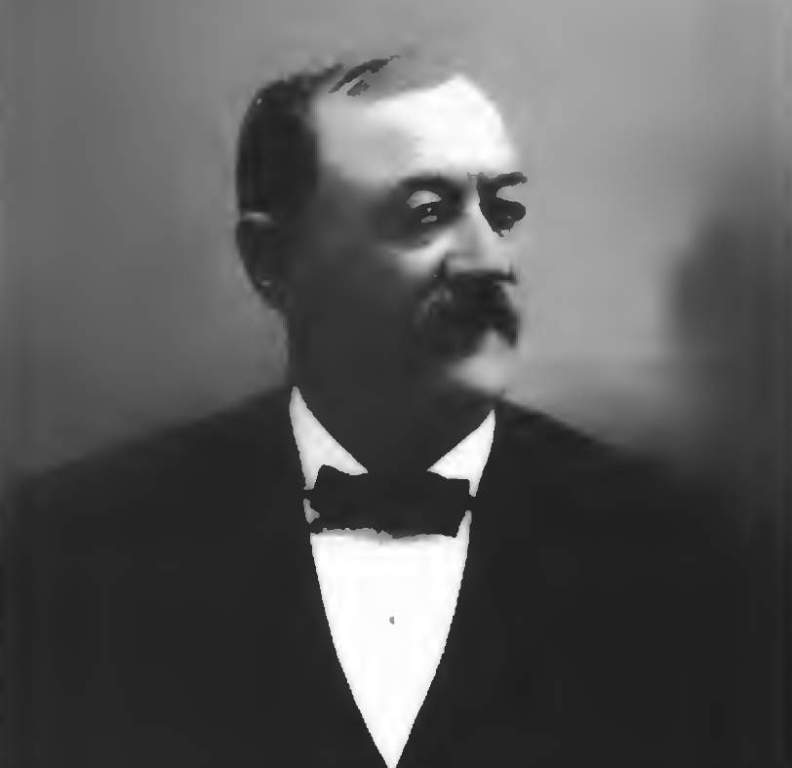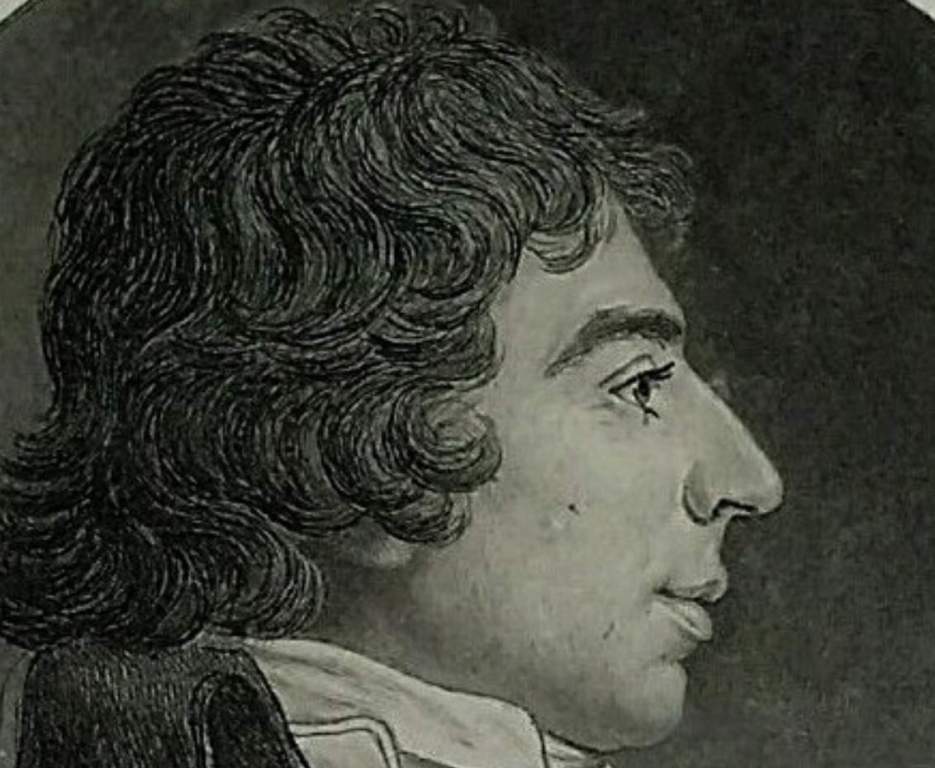George Washington, First President of the United States
Why do people call him that? Let me tell you how he got this name. Many years ago, on the twenty-second of February, in the year 1732, a little baby was born in a comfortable-looking old farmhouse down in Virginia. This baby was named George Washington.
Father of George Washington
The name of George’s father was Augustine Washington. His father was a farmer who planted, raised, and sold large crops of tobacco in the fields near his house.
These fields were called plantations, and George Washington’s father was what is called a planter. He was a very obedient son and always followed his father’s advice.
Mother of George Washington
His mother’s name was Mary Washington. She was a very wise and good woman, and George loved her dearly. His father died when he was very young. Therefore, he was brought up by his mother in the old farmhouse on the banks of the Rappahannock River, just opposite the town of Fredericksburg. Ask someone to show you just where that is on the map.
George Washington Personality
George was a good boy. He was honest, truthful, obedient, bold, and strong. He could jump the farthest, run the fastest, climb the highest, wrestle the best, ride the swiftest, swim the longest, and ”stump” all the other boys he played with. They all liked him, for he was gentle, kind, and brave; he never was mean, never got “mad,” and never told a lie.
Young George Washington Riding a Colt
His mother had a sorrel colt that she thought very much of because it came of splendid stock and, if once trained, would be a fine and fast horse. But the colt was wild and vicious, and people said it could never be trained.
One summer morning, young George and three or four boys were in the field looking at the colt, and the boys said again that it could never be tamed.
George said, You help me gel on his back, and I’ll take him.” After Lard’s work, they got a bridle-bit in the colt’s mouth and put young George on its back.
Then began a fight. The colt reared, kicked, plunged, and tried to throw George off. But George stuck on and finally conquered the colt, so he drove it about the field. But in a last mad plunge to free itself from this determined boy on its back, the colt burst a blood vessel and fell to the ground, dead.
Then the boys felt worried, you may be sure. But while they were wondering what George’s mother would say, the boy went straight to the house, determined to tell the truth. Mother,” he said, “your colt is dead.”
“Dead!” said his mother, shocked. “Who killed it?”I did,” said George in an honest way, and then he told her the whole story. His mother looked at him for a moment, then said, “It is well, my son. I am sorry to lose the colt; it would have been a fine horse, but I am proud to know that my son never tries to put the blame for his acts upon others and always speaks the truth.”
So, you see, early in his life, this boy was one to be depended upon. This story, too, shows you that besides being so truthful and honest, young George Washington did not give up trying to do a thing until he succeeded. He was bound to tame that fierce sorrel colt, and he stuck to it until he had conquered the animal instead of letting it conquer him.
George Washington Facts
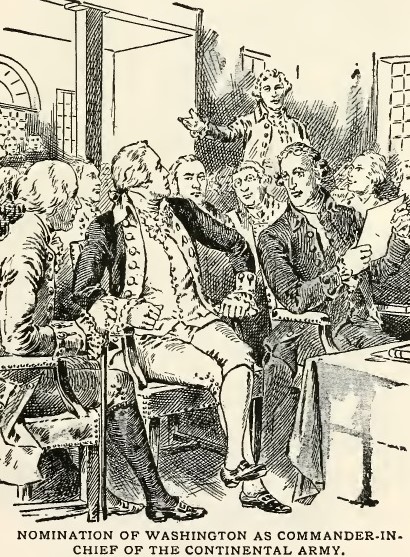 He loved the woods, and he loved the water. He wanted to be a sailor, but when he saw that his mother did not wish him to go away to sea, he said, “All right, mother,” and he stayed at home to help her on her farm.
He loved the woods, and he loved the water. He wanted to be a sailor, but when he saw that his mother did not wish him to go away to sea, he said, “All right, mother,” and he stayed at home to help her on her farm.
When he was sixteen years old, he gave up going to school and became a surveyor. A surveyor is one who goes around measuring land so that men can know just how much they own and just where the lines run that divide it from other people’s land.
This work kept George out of doors most of the time and made him healthy, big and strong. He went off into the woods and over the mountains, surveying land for the owners.
George lived among Indians, bears, and hunters and became a great hunter himself. He was a fine-looking young fellow then and was almost six feet tall. George was strong and active and could stand almost anything in the way of out-of-door dangers and experiences.
George Washington had light brown hair, blue eyes, and a frank face, and he had such a nice, firm way about him, although he was quiet and never talked much. People always believed what he said, and those who worked with him were always ready and willing to do just as he told them. When he was a boy, it took a brave man to be a surveyor. He had to live in the forests, facing all sorts of dangers and risks.
He had to meet all kinds of people and settle disputes about who owned the land, and those who were quarreling about it would be very angry with the surveyor. But young George Washington always won in the end, and his work was so well done that some of his records and measurements have not been changed from that day to this.
He liked the work because he liked the free life of the woods and mountains. He liked to hunt and swim and ride and row, and all these things and all these rough experiences helped him greatly to be a bold, healthy, active, and courageous man when the time came for him to be a leader and a soldier.
People liked him so much that when there was trouble between the two nations that owned almost all the land in America when he was a boy, he was sent with a party to try and settle a quarrel as to which nation owned the land west of Virginia, in what is now called Ohio.
These two nations were France and England. Their kings were far over the Atlantic Ocean. Virginia and all the country between the mountains and the sea, from Maine to Georgia, belonged to the King of England. There was no President then; there was no United States.
George Washington went off to Ohio and tried to settle the quarrel, but the French soldiers would not settle it as the English wished them to. They built forts in the country and said they meant to keep it all for the King of France.
So George Washington was sent out again. This time he had a lot of soldiers with him to drive the French away from their forts. The French soldiers would not give in, and Washington and his soldiers had a fight with the French and whipped them. Then the French King sent more soldiers and built more forts, and the English King sent more soldiers, and there was war in the land. War is a terrible thing, but sometimes it must be made.
The King of England was very angry with the French, and he sent over soldiers from England to fight the French. They were led by a British general whose name was Braddock. He was a brave man, but he thought he knew how to do everything, and he would not let anyone else tell him how he ought to act. But he had never fought in such a land as America, where there were great forests, Indians, and other things very different from what he was used to.
George Washington knew that if General Braddock and the British soldiers wished to whip the French and the Indians, who were on the French side, they must be very careful when they were marching through the forest to battle. He tried to make General Braddock see this, too, but the British General thought he knew best, and he told Washington to mind his own business.
So, the British soldiers marched through the forest just as if they were parading down Broadway. They looked very fine, but they were not careful of themselves, and one day, in the forest, French and Indians, who were hiding behind trees waiting for them, sprang out upon them and surprised them, surrounded them, and fired guns at them from the thick, dark woods. The British were caught in a trap.
They did not know what to do. General Braddock was killed, as were many of his soldiers, and they would all have been killed or taken prisoners if George Washington had not been there. He knew just what to do. He fought bravely, and when the British soldiers ran away, he and his Americans kept back the French and Indians and saved the British army. But it was a terrible defeat for the soldiers of the King of England.
George Washington Crossing Delaware
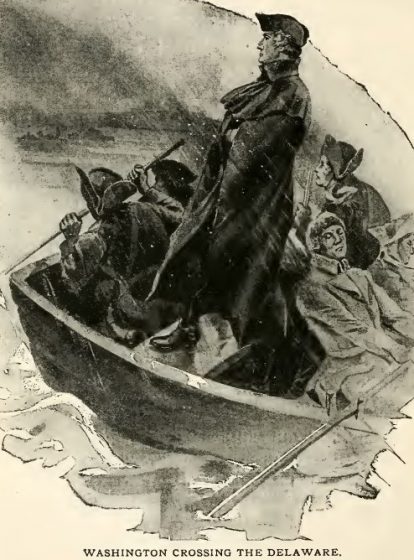 He had to send more soldiers to America and fight for a long time. But at last his soldiers were successful, and, thanks to Colonel Washington, as he was now called, the English lands were saved and the French were driven away.
He had to send more soldiers to America and fight for a long time. But at last his soldiers were successful, and, thanks to Colonel Washington, as he was now called, the English lands were saved and the French were driven away.
After the war was over, George Washington married his wife. All American boys and girls know her name. It was Martha Washington. They went to live in a beautiful house on the banks of the Potomac River, in Virginia. It is called Mount Vernon.
It was Washington’s home all the rest of his life. The house is still standing, and people nowadays go to visit this beautiful place just to see the spot that everyone thinks so much of because it was the home of Washington. Perhaps, someday, you will see it. You will think it is a beautiful place.
While Washington was looking after his great farm at Mount Vernon, things were becoming very bad in America. The King of England said the people in America must do as he told them and not as they wished. But the Americans said that the King was acting very wrongly towards them and that they would not stand it. They did not.
Life of George Washington
When the King’s soldiers tried to make them do as the King ordered, they said they would die rather than yield, and in a place called Lexington, in Massachusetts, some of the Americans took their guns and tried to drive off the British soldiers. This is what is called rebellion. It made the King of England very angry, and he sent over ships full of soldiers to make up the American’s minds.
But the Americans would not. The men in the thirteen different parts of the country called the thirteen colonies got together and said they would fight the King’s soldiers. The King tried to make them do as he wished. So, they got up an army and sent it to Massachusetts, and there they had famous battle soldiers, called Bunker Hill. The leading men in the colonies saw that they must put a brave man at the head of their army.
There was but one man they thought about this. Do you know who George Washington is? He rode all the way from Mount Vernon, in Virginia, to Cambridge, Massachusetts, on horseback because, you know, they had no steam cars or steamboats in those days. As he was riding through Connecticut with a few soldiers as his guard, a man came galloping across the country, telling people he had fought.
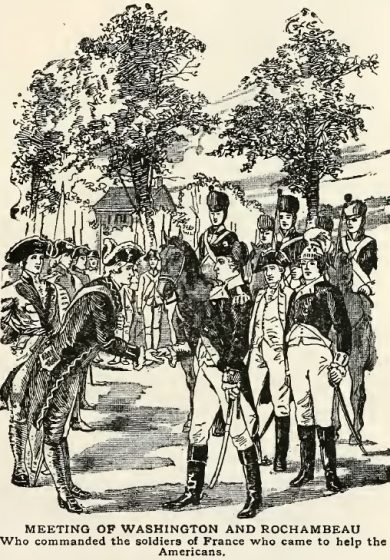 The British soldiers had driven the Americans from the fort and said they had won. But it had been hard work for the soldiers of the king. Washington stopped the rider and asked him why the Americans had been driven out of the fort. “
The British soldiers had driven the Americans from the fort and said they had won. But it had been hard work for the soldiers of the king. Washington stopped the rider and asked him why the Americans had been driven out of the fort. “
Because they had no powder and shot left,” replied the messenger. “And did they stand the fire of the British guns as long as they could fire back?” asked Washington. “That they did,” replied the horseman. “They waited, too, until the British were close to the fort before they fired.
That was what Washington wished to know. He felt certain that if the American farmer boys who stood out against the King’s soldiers did not get frightened or timid in the face of trained soldiers of the king they would be the kind of soldiers he needed to win with. He turned to his companion. Then the liberties of the country are safe, he said, and he rode on to Cambridge to the command of the army.
If ever you go to Cambridge, Massachusetts, you can see the tree under which Washington sat on horseback when he took command of the American army. It is an old tree now, but everybody loves to look at it and to think of the splendid-looking soldier, in his uniform of buff and blue, who, on a July day, long, long ago, sat his horse so gallantly beneath that shady elm and looked at the brave men who were to be his soldiers, and by whose help he hoped to make his native land a free and independent nation.
So, at his camp at Cambridge, he drilled his army of farmers and fishermen, and when he was ready, he drove the British away from Boston without a battle when all the American leaders met in the City of Philadelphia and said they would no longer obey the King of England but would set up a nation of their own.
They called this new nation the United States of America, and they signed a paper that told all the world that the men of America would no longer obey the King of England but would be free, even if they had to fight for their freedom. You know what this great paper they signed is called the Declaration of Independence.
The day that they decided to do this is now the greatest day in all of America. You remember it every year and celebrate it with firecrackers, fireworks, flags, and no school. It is on July 4. Well, the King of England was very angry at this. He sent more ships and soldiers over the sea to America, and there was a long and bloody war. It was called the American Revolution.
There was fighting for seven years, and, through it all, the chief man in America, the man who led the soldiers and fought the British, and never gave up, nor ever let himself or his soldiers grow afraid, even when he was beaten, was General George Washington. If the British drove him away from one place, he marched to another, and he fought and marched and kept his army brave and determined.
Even when they were ragged and tired, everything looked as if the British would be successful. When the British whipped him in the Battle of Long Island, at Brooklyn, and thought they had caught all the American army, Washington, one stormy night, got all his soldiers safely across the river to New York.
The British had to follow and fight. And, again, when it looked as if the Americans must surely give in, Washington took his soldiers, one terrible winter’s night, across the Delaware River and fell upon the British, when they were not expecting him, and won the battle of Trenton.
There were many hard and bitter days for George Washington through these years of fighting. One winter, especially, was very bad. The British soldiers seemed victorious everywhere. They held the chief cities of New York and Philadelphia, and the weak American army was half-starved, cold, and shivering in a place in Pennsylvania called Valley Forge.
Washington was there, too, and it took all his strength and all his heart to keep his soldiers together and make them believe that, if they would only “stick to it,” they would beat the British at last. But when their log huts were all covered with snow and they had hardly clothes enough to keep them warm or food to keep them from being hungry, it was not easy for the soldiers to see victory ahead, and if it had not been for Washington, the American, the army would have melted away, owing to that dreadful winter at Valley Forge.
But he held it together, and when spring came, he marched away from Valley Forge. Part of his army was attacked by the British at a place called Monmouth Court House. Badly he was almost beaten and driven back when General Washington came galloping up. He stopped the soldiers who were running away.
George brought up other soldiers to help them, and he fought so boldly and bravely and was so determined that at last he drove off the British and won the important battle of Monmouth. You see, he would not give in when people told him he would have to. and that the British get all the cities and towns.
He said that the country was large and that sooner than give in, he would go with his soldiers into the mountains and keep up the war until the British were so sick of it that they would finally go away. So, he kept on marching and fighting, never giving in, even when things looked worse, and, at last, on the 19th of October, in the year 1781, he captured the whole British army at a place called Yorktown, in Virginia, and the Revolution was ended. So, the United States won its freedom.
They have been a great nation ever since, and every American, from that day to this, knows that they gained their freedom because they had such a great, brave, noble, patriotic, strong, and glorious leader as General George Washington. After the Revolution was over and Washington had said goodbye to his soldiers and his generals, he went back to Mount Vernon and became a farmer again.
But the people of America would not let him stay a fan. They got together again in Philadelphia, and, after much thought and talk, they drew up a paper that said just how the new nation should be governed. This is called the Constitution of the United States. The Constitution said that, instead of a king, the people should pick out and elect what they called one man, who should be the head man of the nation for four years at a time.
He was to preside over things, and so he was called the President. When the time came to elect the first president, there was just one man in the United States that everybody said must be the president. Of course, you know who this man was—George Washington. It was a great day for the new nation when he was declared president.
This is what we call being “inaugurated.” All along the way, as he rode from Mount Vernon to New York, people came out to welcome him. They fired cannons and rang bells and made bonfires and put up arches and decorations; little girls scattered flowers in his path and sang songs of greeting, and whenever he came to a town or city, everyone turned out and marched in procession, escorting Washington through their town.
When he came to New York after he had crossed the bay in a big rowboat, he went in a fine procession to a building called “Federal Hall” on Wall Street, and there he stood, on the front balcony of the building, in front of all the people, and, with his hand on an open Bible, he said he would be a wise, good, and faithful President.
Then the judge, who had read to him the words he repeated, lifted his hand and cried out, “Long live George Washington, President of the United States!” A flag was the run-up to the cupola of the hall, cannon boomed, bells rang, and all the people cheered and cheered their hero and general, whom they had now made the head of the whole nation. So, George Washington became President of the United States.
He worked just as hard to make the new nation strong, great, and peaceful as he did when he led the army in the Revolution. People had all sorts of things to suggest. Some of those things were foolish, some were wrong, and some would have been certain to have broken up the United States and lost all the things for which the country fought in the Revolution. But Washington was at the head.
He knew just what to do, and he did it. From the day when, in the City of New York, he was made President—that is what we call his inauguration—he gave all his thought, all his time, and all his strength to make the United States united, prosperous, and strong. And, when his four years as president were over, the people would not let him give up but elected him as their president for another four years.
Wife of George Washington
When Washington was president, the capital of the United States was first New York and then Philadelphia. Washington and his wife, whom we know as Martha Washington, lived in fine style and made a very noble-looking couple. They gave receptions occasionally, to which the people would come to be introduced and see the man of whom all the world was talking. Washington must have been a splendid-looking man then.
He was tall and well-built. He dressed in black velvet with silver knees and shoe buckles; his hair was powdered and tied up in what was called a 14-queue.” He wore yellow gloves and held his three-cornered hat in his hand. A sword in a polished white leather sheath hung at his side, and he would bow to each one who was introduced to him.
He had so good a memory that if he heard a man’s name and saw his face at one introduction, he could remember and call him by name when he met him again. But though he was so grand and noble, he was very simple in his tastes and his talk and desired to have no title, but only this: President of the United States.
PI’s second term as president was just as successful as his first four years had been. He kept the people from getting into trouble with other countries; he kept them from war and danger and quarrels and loss. But it tired him all out and made him an old man before his time. He had given almost all his life to America. When his second term ended, the people wished him to be president for the third time. But he would not.
Washington’s Farewell Address
He wrote a long letter to the people of America. It is called “Washington’s Farewell Address.” He told them they were growing stronger and better, but that he was worn out and must have rest. He told them that if they would be wise, peaceful, and good, they would become a great nation; that all they had fought for and all they had gained would last if they would only act right, and so they would become great and powerful. So, another man was made president, and Washington went back to his farm at Mount Vernon.
He was the greatest, the wisest, and the most famous man in all of America. People said it was because of what he had done for them that their country was free, powerful, and strong. They said that George Washington was “the father of his country.” I think he was very glad to get back to Mount Vernon. He loved the beautiful old place, and he had been away from it for eight years.
George Washington liked to be a farmer, with such a great farm to look after as there are in Virginia. He found very much to do, and he mended, built, and enlarged things, rode over his broad plantations, or received in his fine old house the visitors who came there to see the greatest man in all of America.
There came a time when he thought he would have to give up this pleasant life and go to be a soldier once more. For there came very near being a war between France and the United States, and Congress begged Washington to take command of the army once more.
He was made lieutenant-general and commander-in-chief and hurried to Philadelphia to gather his army together. Fortunately, the war did not occur, and the new nation was saved from all that trouble and bloodshed. So he went back again to his beloved Mount Vernon. But he did not live long enough to enjoy the peace and quiet that were his right.
Death
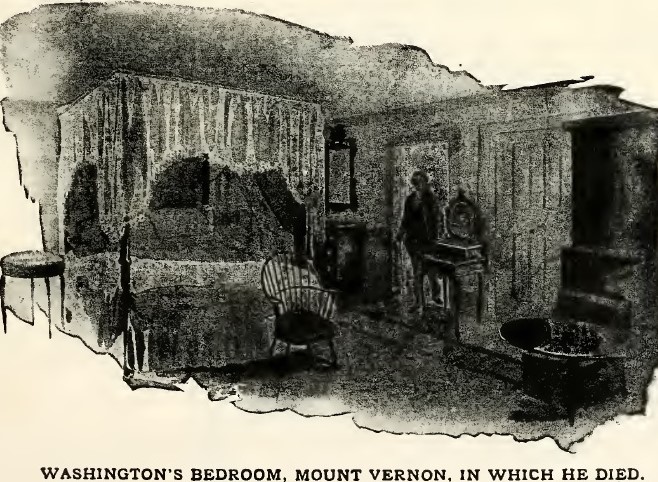 For, one December day, as he was riding over his farm, he caught a cold and had the croup. He had not the strength that most boys and girls must carry him through such a sickness. He was worn out, and, though the doctors tried hard to save his life, they could not, and in two days he died. It was a sad day for America — the twelfth day of December, in the year 1 799.
For, one December day, as he was riding over his farm, he caught a cold and had the croup. He had not the strength that most boys and girls must carry him through such a sickness. He was worn out, and, though the doctors tried hard to save his life, they could not, and in two days he died. It was a sad day for America — the twelfth day of December, in the year 1 799.
All the world sent condolence letters with deep grief and sorry. Entire the world had come to look upon George Washington as the greatest man of his time. Kings and nations put on mourning for him, and, all over the world, bells tolled, drums beat, and flags were dropped to half-mast when the news came that Washington was dead.
When you grow up and go to Mount Vernon, as every American boy and girl should do someday, you will see his tomb. It is a plain and simple building, just as plain and simple as he was, and it stands close to his house, on the green banks of the beautiful Potomac River he loved so much. Then, sailing up the Potomac, or riding on the steam cars, you will come to the beautiful city that is named for this great man Washington, the capital of the United States.
Then you will see the great white dome of the splendid Capitol, the building in which the American people make laws for the nation that Washington founded. There is the White House, where all the presidents since his day have lived; there is the tall, white monument, the highest in the world.
That the American people have built to honor his memory and his name. And in the cities and towns of America, there are statues, streets, parks, schools, and buildings named after him. And built because all the world knows that this great American general and president was the best, the noblest, and the bravest man that ever lived in all of America, George Washington.
First in war, first in peace, first in the hearts of his countrymen.” Love him, children. Never forget him. Try to be like him. Thus, may you grow to be good men and women. Therefore, good Americans
Read More
-
Legal and Ethical Issues in Salvaging Titanic Wreck
-
Architecture and Applied Arts in Old Spain
-
The Historical Rare Pictures of RMS Titanic Ship
-
Shah Abbas – The Great Safavid King of Persia
-
Titanic History – A Miserable Night to Remember

